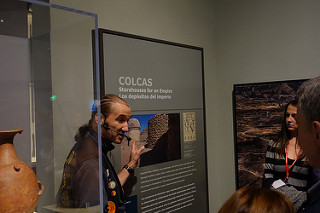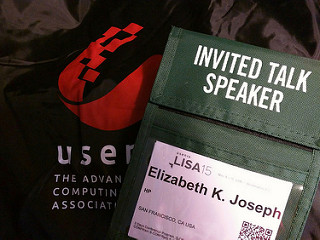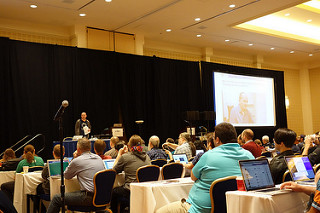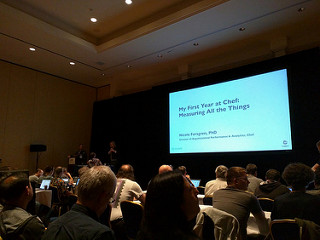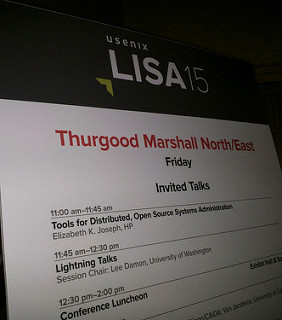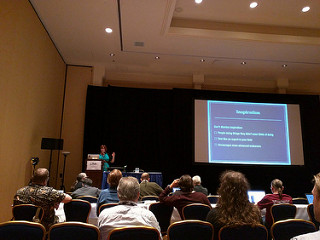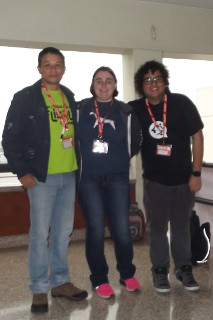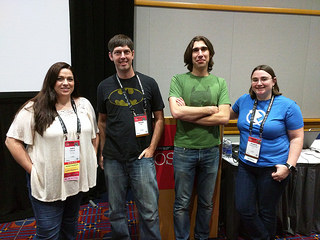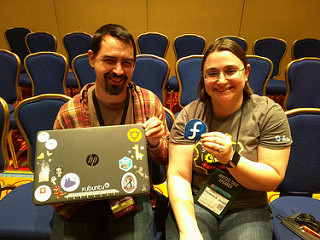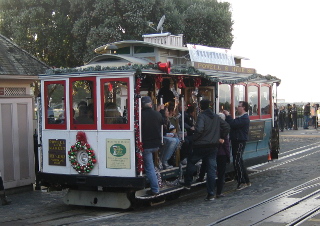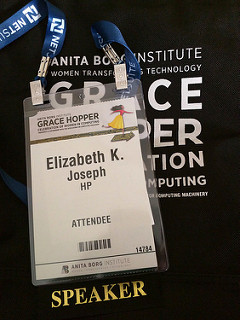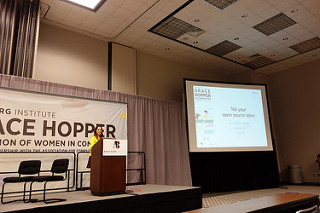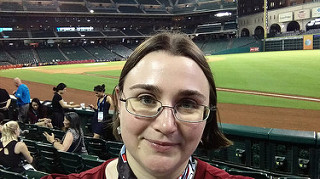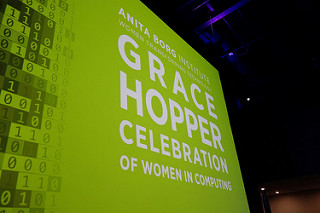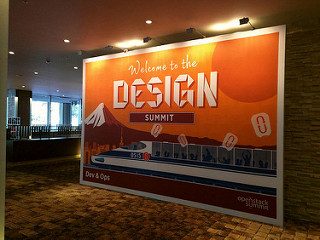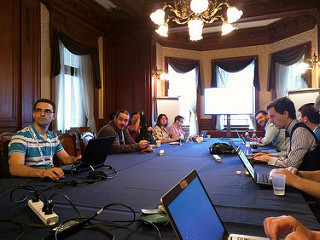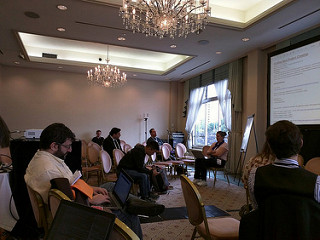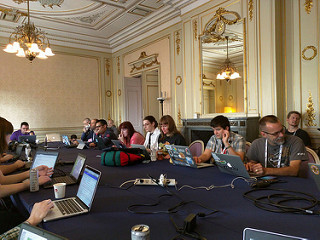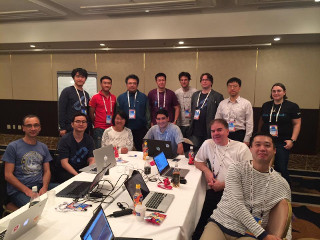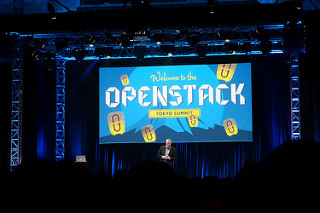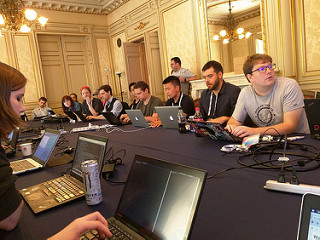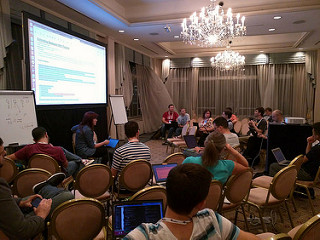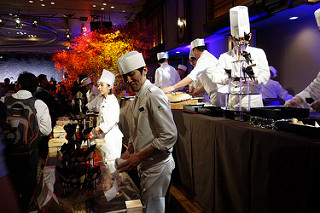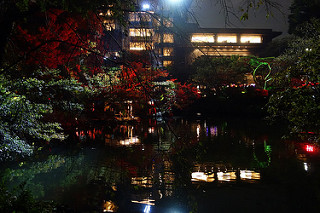After a quick trip to Las Vegas in October, I was off to Houston for my first Grace Hopper Celebration of Women in Computing! I sometimes struggle some with women in computing events, and as a preamble to this post I wrote about it here. But I was excited to finally attend a Grace Hopper conference and honored to have my talk about the Continuous Integration system we use in the OpenStack project accepted in the open source track.
Since I’m an ops person and not a programmer, the agenda I was looking at leaned very much toward the keynotes, plenaries and open source, with a few talks just for fun thrown in. Internet of Things! Astronauts!
Wednesday kicked off with a series of keynotes. The introduction by Telle Whitney, CEO and President of the Anita Borg Institute for Women and Technology (ABI) included statistics about attendees, of which there were 12,000 from over 60 countries and over 1,000 organizations. She then introduced the president of the ACM, Alexander L. Wolf, who talked about Association for Computing Machinery (ACM) and encouraged attendees to join professional organizations like the ACM in order to bring voice to our profession. I’ve been a member since 2007.
The big keynote for the morning was by Hilary Mason, a data scientist and Founder at Fast Forward Labs. She dove into the pace of computer technology, progress of Artificial Intelligence and how data is driving an increasing amount of innovation. She explained that various mechanisms that make data available and the drop in computing prices has helped drive this, explaining that what makes a machine intelligence technology interesting tends to follow four steps:
- A theoretical breakthrough
- A change in economics
- A capability to build a commodity
- New data is available
Slides from her talk are on slideshare.
From the keynotes I went to the first series of open source presentations which began with a talk by Jen Wike Huger on contributing to opensource.com. As a contributor already, it was fun to hear her talk and I was particularly delighted to see her highlight three of my favorite stories as examples of how telling your open source story can make a difference:
The next presentation was by Robin J. Goldstone, a Solutions Architect at Lawrence Livermore National Laboratory (LLNL) where they work on supercomputers! Her talk centered around the extreme growth of open source in the High Performance Computing (HPC) space by giving a bit of a history of supercomputing at LLNL and beyond, and how the introduction of open source into their ecosystem has changed things. She talked about their work on the CHAOS Linux clustering operating system that they’ve developed which allows them to make changes without consulting a vendor, many of whom aren’t authorized to access the data stored on the clusters anyway. It was fascinating to hear her speak to how it’s been working in production and she expressed excitement about the ability to share their work with other organizations.
From there, it was great to listen to Sreeranjani (Jini) Ramprakash of Argonne National Laboratory where they’re using Jenkins, the open source Continuous Integration system, in their supercomputer infrastructure. Most of her talk centered less around the nuts and bolts of how they’re using it, and more on why they chose to adopt it, including the importance testing changes in a distributed team (can’t just tap on a shoulder to ask why and when something broke), richer reports when something does break and shorter debug time since all changes are tested. When talking about Jenkins specifically, we learned that they had used it elsewhere in their organization so adopting that hosted version was at first a no-brainer, but then when they learned that they really had to run their own. The low bar created by it being open source software allowed them to run it themselves without too much of an issue.
That afternoon I attended the plenaries, kicked off by Clara Shih, the CEO and Founder at Hearsay Social. Her talk began by talking about how involvement with the Grace Hopper conference and ABI helped prepare her early for success in her career, and quickly launched into 5 major points when working in and succeeding with technology:
- Listen carefully (to everyone: customers, employees)
- Be OK with being different (and you have to be yourself to truly be accepted, don’t fake it)
- Cherish relationships above all else (both personal and professional, especially as a minority)
- There is no failure, only learning
- Who? If not us. When? If not now. (And do your part to encourage other women in tech)
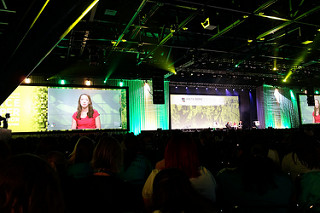 Clara Shih keynote
Clara Shih keynoteHer plenary was followed by a surprising one from Blake Irving, the CEO of GoDaddy. GoDaddy has a poor reputation when it comes to women, particularly with respect to their objectifying ad campaigns that made the company famous early on. In his talk, I felt a genuine commitment from him personally and the company to change this, from the retirement of those advertisements and making sure the female employees within GoDaddy are being paid fairly. Reflecting on company culture, he also said they wanted advertising to reflect the passion and great work that happens within the company, in spite of poor public opinion due to their ads. They’re taking diversity seriously and he shared various statistics about demographics and pay within the company to show gender pay parity in various roles, which is a step I hadn’t seen a company do before (there are diversity stats from several companies, but not very detailed or broken up by role in a useful way). The major take-away was that if a company with a reputation like GoDaddy can work toward turning things around, anyone can.
The final plenary of Wednesday was from Megan Smith, the Chief Technology Officer of the United States. The office was created by President Obama in 2009 and Smith is the third person to hold the post, and the first woman. Her talk about the efforts being made by the US government to embrace the digital world, from White House Tech Meetups, the TechHire Initiative and White House Demo Days and Maker work. Even more exciting, she brought a whole crew of women from various areas of the government to speak on various projects. One spoke on simplifying access to Veteran Medical records through digital access, another on healthcare more broadly as they worked to fix Healthcare.org after it was launched. A technology-driven modernization effort to the immigration system was particularly memorable, as work to make it easier and cheaper for potential citizens to get the resources they need without the mountain of confusing and expensive forms that they often have to go through today to become citizens and bring family members to the United States. It was also interesting to learn about the open data initiatives from data.gov as well as how citizens can help bring more records online through the Citizen Archivist program. I was also really impressed with their commitment to open source throughout all of their talks. It seems obvious to me that any software developed with my tax dollars should be made available to me in an open source manner, but it’s only recently that this has actually started to gain traction, and this administration seems committed to making sure we continue to go in this direction.
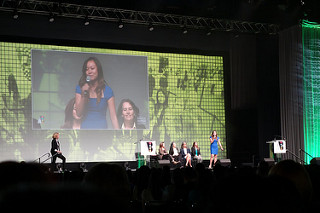 Technologists in US Government!
Technologists in US Government!A quick walk through the opening of the career fair and exposition hall finished up my day. It was a pretty overwhelming space. So many companies seeking to interview and hiring from the incredible pool of talent that GHC brings together.
My Thursday was very busy. It began with an HP networking breakfast, with the 70 or so people from HP who came to the conference as attendees (not booth and interview staff) could meet up. I got a surprise at the breakfast by being passed the microphone after several VPs spoke as I was one of the two speakers from HP who was attending the conference and the only one at the breakfast, no pressure! From there, it was off to the keynotes.
I really enjoyed hearing from Hadi Partovi, the Founder of Code.org about his take on the importance of humans being taught about coding in the world today and how the work of Code.org is helping to make that happen on a massive scale. The growing demand versus slower creation of computer science professional statistics were grim and he stressed the importance of computer science as a component of primary education. It was impressive to learn about some of the Code.org statistics from their mere 2 years of existence, going into their third year they’re hoping to reach hundreds of thousands of more students.
It was a real pleasure to hear from Susan Wojcicki, the CEO of YouTube. She touched upon several important topics, including myths in computing that keep school age girls (even her own daughter!) away: Computer Science is boring, girls aren’t good at it and discomfort with associating with the stereotypical people who are portrayed in the field. She talked about the trouble with retention of women in CS, citing improvements to paid maternity leave as a huge factor in helping retention at Google.
Following the keynotes I attended the next round of open source sessions. Becka Morgan, a professor at Western Oregon University began the morning with a very interesting talk about building mentorship programs for her students in partnership with open source projects. I learned that she initially had worked with the local Ubuntu team, even having some of her students attend an Ubuntu Global Jam in Portland, an experience she hoped to repeat in the future. She walked us through various iterations of her class structure and different open source projects she worked with in order to get the right balance of structure, support from project volunteers and clear expectations on all sides. It was great to hear about how she was then able to take her work and merge it with that of others in POSSE (Professors’ Open Source Summer Experience) so they could help build programs and curriculum together. Key take-aways for success in her classroom included:
- Make sure students have concrete tasks to work on
- Find a way to interact with open source project participants in the classroom, whether they visit or attend virtually through a video call or similar (Google Hangouts were often used)
- Tell students to ask specific, concrete questions when they need help, never assume the mentors will stop their work to reach out and ask them if they need help (they’re busy, and often doing the mentoring as a volunteer!)
- Seek out community opportunities for students to attend, like the Ubuntu Global Jam
Her talk was followed by one by Gina Likins of Red Hat who talked about the experience in her career moving from a very proprietary company to one that is open and actually develops open source software. As someone who is familiar with structures of open organizations from my own work and open source experiences it was mostly information I was familiar with, but one interesting point she made was that in some companies people hoard information in an effort to make sure they have an edge over other teams. This stifles innovation and is very short-sighted, more importance in sharing knowledge so that everyone can grow is a valuable cultural trait for an organization. Billie Rinaldi followed Gina’s talk with one about working on an Apache Software Foundation project, sharing the benefits of a solid structure and valuable structures for getting involved as important to open source projects and something that the foundation supports.
Prior to a partner lunch that I was invited to, I went to a final morning talk by Dr. Nadya Fouad who published the famous Leaning in, but Getting Pushed Back (and Out) study results where culture, including failure to provide clear and fair advancement opportunities, was cited in their study of women leaving engineering. I’d read articles about her work, as it was widely covered when it first came out as one of the best studies to come out covering the retention problem. Of particular note was that about $3.4 billion in US federal funds are spent on the engineering “pipeline problem” each year, and very little attention is paid to the near 50% of women who complete an engineering degree and don’t continue with an engineering career. I’ve known that culture was to blame for some time, so it was satisfying to see someone do a study on the topic to gather data beyond the unscientific anecdotal stories I had piled up in my own experience with female friends and acquaintances who have left or lost their passion for the tech industry. She helpfully outlined things that were indicators for a successful career path, of course noting that these things are good for everyone: good workload management, psychologically safe environment, supportive leadership, promotion path, equitable development opportunities and an actively supported work/life balance policy.
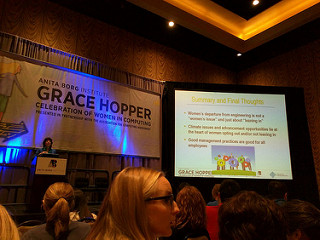 Dr. Nadya Fouad on retention in engineering
Dr. Nadya Fouad on retention in engineeringAfter lunch began the trio of open source presentations that included my own! The afternoon began with a talk by Irene Ros on Best Practices for Releasing and Choosing Open Source Software. This talk gave her an opportunity to attack evaluation of open source from both sides, both what to look for in a project before adopting it and what you need to provide users and a community before you release your own open source project – predictably these are the same thing! She stressed the importance of using a revision control system, writing documentation, version tracking (see semver.org for a popular method), publishing of release notes and changelogs, proper licensing, support and issue tracking and in general paying attention to feedback and needs of the community. I loved her presentation because it included a lot of valuable information packed into her short talk slot, not all of which is obvious to new projects.
My talk came next, where I talked about our Open Source Continuous Integration System. In 20 minutes I gave a whirlwind tour of our CI system, including our custom components (Zuul, Nodepool, Jenkins Job Builder) along with the most popular open source offerings for code review (Gerrit) and CI (Jenkins). I included a lot of links in my talk so that folks who were interested could dive deeper into whichever component my quick overview was of interest to them. I was delighted to conclude my talk with several minutes of engaging Q&A before turning the microphone over to my OpenStack colleague Anne Gentle. Slides from my talk are here: 2015-ghc-Open-Source-Continuous-Integration-System.pdf
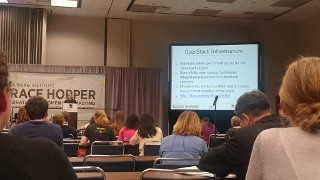 Thanks to Terri Oda for the photo! (source)
Thanks to Terri Oda for the photo! (source)Anne’s talk a great one on documentation. She stressed the importance of treating open source documentation just like you would code. Use revision control, track versions, make the format they are written in simple (like reStructuredText) and use the same tooling as developers so it’s easy for developers to contribute to documentation. She also spoke about the automated test and build tools we use in OpenStack (part of our CI system, yay!) and how they help the team continue to publish quickly and stay on top of the progress of documentation. It was also worthy to note that writing documentation in OpenStack grants one Active Technical Contributor status, which gives you prestige in the community as a contributor (just like a developer) and a free ticket to the OpenStack summits that happen twice a year. That’s how documentation writers should be treated!
Since our trio of talks followed each other immediately, I spent the break after Anne’s talk following up with folks in the audience who were interested in learning more about our CI system and generally geeking out about various components. It was a whole lot of fun to chat with other Gerrit operators and challenges that our Nodepool system solves when it comes to test node handling. I had a lot of fun, and it’s always great when these conversations follow me for the rest of the conference like they did at GHC.
The next session I attended was the Women Lead in Open Source panel. A fantastic lineup of women in open source explored several of the popular open source organizations and opportunities for women and others, including Systers, Google Summer of Code, Outreachy and OpenHatch. The panel then spent a lot of time answering great questions about breaking into open source, how to select a first project and searching for ways to contribute based on various skills, like knowledge of specific programming languages.
The plenary that wrapped up our day was a popular one by Sheryl Sandberg, which caused the main keynote and plenary room to fill up quickly. For all the criticism, I found myself to be the target audience of her book Lean In and found tremendous value in not holding back my career while waiting for other parts of my life to happen (or not). Various topics were covered in her plenary, from salary parity across genders and the related topic of negotiation, bringing back the word “feminism” and banning the word “bossy”, equal marriages, unconscious bias and the much too gradual progress on C-suite gender parity. She has placed a lot work and hope into Lean In Circles and how they help build and grow the necessary professional networks for women. She advised us to undertake a positive mindfulness exercise before bed, writing down three things you did well during the day (“even if it’s something simple”). A strong conclusion was made by telling us to stay in technology, because they are the best jobs out there.
With the plenary concluded, I went back to my hotel to “rest for a few minutes before the evening events” and promptly fell asleep for 2.5 hours. I guess I had some sleep debt! In spite of missing out on some fun evening events, it probably a wise move to just take it easy that evening.
Friday’s keynote could be summed up concisely with one word: Robots! Valerie Fenwick wrote a great post about the keynote by Manuela Veloso of Carnegie Mellon University here: GHC15: Keynote: Robotics as a Part of Society.
As we shuffled out of the last keynote, I was on my way back to the open source track for star-studded panel (ok, two of them are my friends, too!) of brilliant security experts. The premise of the panel was exploring some of the recent high profile open source vulnerabilities and the role that companies now play in making sure this widely used tooling is safe, a task that all of the panelists work on. I found a lot of value in hearing from security experts what struggles they have when interacting with open source projects, like how to be diplomatic about reporting vulnerabilities and figuring out how to do it securely when a mechanism isn’t in place. They explored the fact that most open source projects simply don’t have security in mind, and they suggested some simple tooling and tips that can be used to evaluate security of various types of software, from Nmap and AFL to the OSWASP Top 10 of 2013 which is a rundown of common security issues with software, many of which are still legitimate today and the Mozilla wiki that has a surprising amount of security information (I knew about it from their SSL pages, lots of good information there). They also recommended the book The Art of Software Security Assessment and concluded my mentioning that learning about security is a valuable skill, there are a lot of jobs!
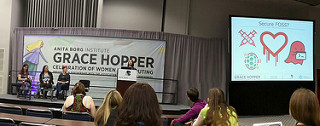
I had a bit of fun after the security panel and went to one of the much larger rooms to attend a panel about Data Science at NASA. Space is cool, and astronaut Catherine Coleman on the panel to talk about her work on the International Space Station (ISS)! It was also really fun to see photos of several women she’s worked with on the ISS and in the program, as female *nauts are still a minority (though there are a lot of female technologists working at NASA). I enjoyed hearing her talk about knowing your strengths and those of the people you’re working, since your life could depend upon it, teams are vital at NASA. Annette Moore, CIO of the Johnson Space Center, then spoke about the incredible amount of data being sent from the ISS, from the results of experiments to the more human communications that the astronauts need to keep in contact with those of us back on Earth. I have to admit that it did sound pretty cool to be the leader of the team providing IT support for a space station. Dorothy Rasco, CFO at Johnson Space Center, then spoke about some of the challenges of a manned mission to Mars, including handling the larger, more protected lander required, making sure it gets there fast enough, and various questions about living in a different atmosphere and food (most doesn’t have a shelf life beyond 3 years, not long enough!). Panel moderator and CTO-IT of NASA Deborah Diaz then took time to talk more broadly about the public policy of data at NASA which meant some interesting and ongoing big data challenges around making sure it’s all made available effectively. She shared a the link to open.nasa.gov that has various projects for the public, including thousands of data sets, open source code repositories and almost 50 APIs to work with. Very cool stuff! She also touched upon managing wearables (our new “Internet of Things”) that astronauts have been wearing for years, and how to manage all the devices on a technology and practical level, to record and store important scientific data collected, all without overburdening those wearing them.
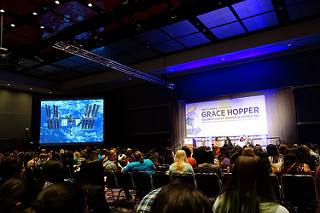
Later in the afternoon I went to a fun Internet of Things workshop where we split into groups and tried to brainstorm an IoT product while paying careful attention to security and privacy around identity and authentication mechanisms for these devices. Our team invented a smart pillow. I think we were all getting pretty tired from conferencing!
The conference concluded with an inspiring talk from Miral Kotb, the Founder of iLuminate. A brilliant software engineer, I loved hearing about her passion for dance and technology, and how she followed both to dream up and build her company. I’d never heard of iLuminate before, but for the other uninitiated their performances are done in the dark with full body suits that use a whole bunch of lights synced up with their proprietary hardware and software to give the audience a light, music and dance show. Following her talk she brought out the dancers to close the conference with a show, nice!
I met up with some friends and acquaintances for dinner before going over to the closing party, which was held in the Houston Astros ballpark! I had fun, and made it back to the hotel around 10:30 so I could collect my bags and make my move to a hotel closer to the airport so I could just take a quick shuttle in the early AM to catch my flight to Tokyo the next day.
More photos from the conference and after party here: https://www.flickr.com/photos/pleia2/albums/72157659453000380
It was quite a conference, I’m thankful that I was able to participate. The venue in Houston was somewhat disruptively under construction, but it’s otherwise a great space and it was great to learn that they’ll be holding the conference there again next year. I’d encourage women in tech I know to go if they’re feeling isolated or looking for tips to succeeding. If you’re thinking of submitting a talk, I’d also be happy to proof and make recommendations about your proposal, as it’s one of the more complicated submission processes I’ve been through and competition for speaking slots is strong.



